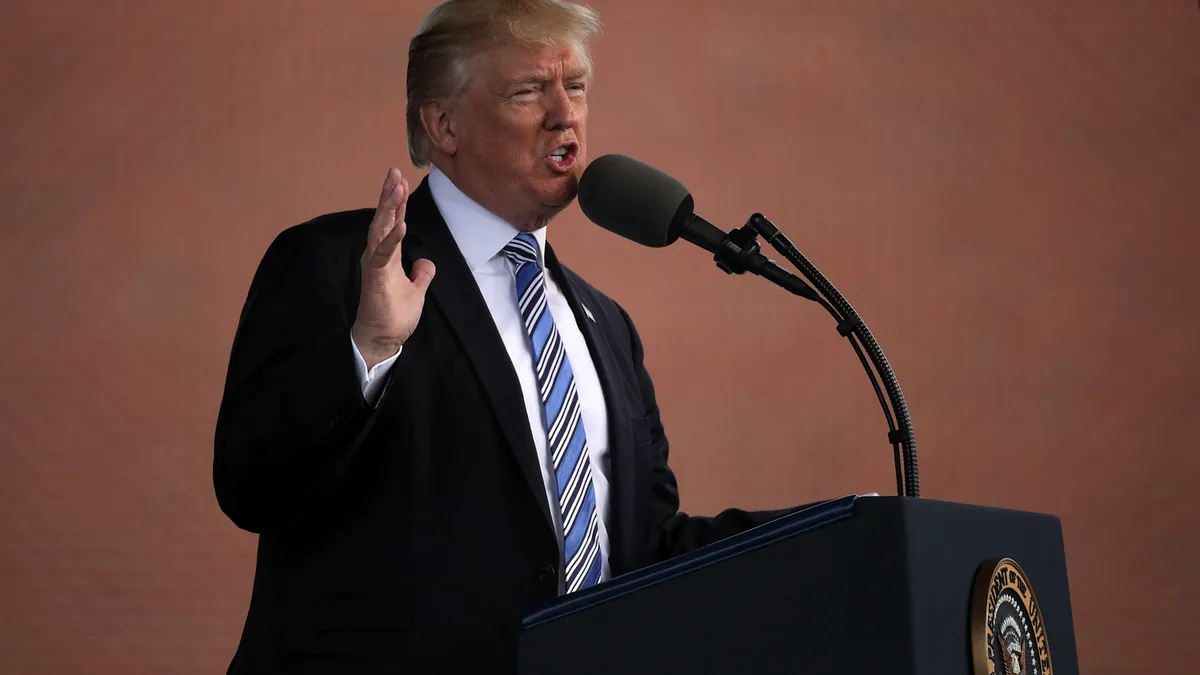Dive Brief:
- President Donald Trump told reporters at the White House Thursday he would not meet with Chinese President Xi Jinping before the March 1 deadline, after which 10% tariffs are set to rise to 25%. Trump said previously he would meet Xi in February.
- When asked by reporters if he planned to meet with Xi next month, the President said, "Not yet. Maybe. Probably too soon. Probably too soon," according to Reuters.
-
U.S. Trade Representative Robert Lighthizer and Treasury Secretary Steven Mnuchin will travel to Beijing next week for another round of trade discussions. Lighthizer and Chinese Vice Premier Liu He met last week in Washington for trade talks.
Dive Insight:
Trade discussions between the U.S. and China are far from over. Several rounds have taken place since Trump and Xi agreed to a 90-day halt on tariff increases last year at the G-20 summit, and additional discussions are scheduled for next week.
But the likelihood of reaching a deal in the near future is waning. The deadline is rapidly approaching with no plans in place for the two presidents to meet. "No final deal will be made until my friend President Xi, and I, meet in the near future," Trump tweeted on Jan. 31.
What happens to tariff rates on March 2 remains unclear. After the 90-day "cease-fire" was announced, the Trump administration maintained tariffs on $200 billion worth of Chinese imports would rise from 10% to 25% if the two parties did not reach a deal before the deadline.
"The likely outcome is that the tariffs remain at the current 10 percent rate," CNBC reported Thursday, citing administration officials and sources briefed by the White House.
But Reuters later cited three anonymous sources who indicated the CNBC report was incorrect.
Maine Pointe CEO Steve Bowen told Supply Chain Dive he doesn't expect Trump to back down "one iota" from his plan to raise tariffs and negotiate trade issues with China.
He does anticipate the U.S. and China could reach a deal later this year to remove the tariffs, with the upcoming election cycle playing a role in the timing. The CEO of agricultural trader Archer Daniels Midland (ADM) made a similar prediction, expecting a trade resolution with China this year.
The March 2 tariff hike (if it happens) won't come as a surprise to the business world. The U.S. and China sought to resolve deep-seated trade issues in just three months, and analysts largely agreed the short time frame did not provide sufficient time for matters such as intellectual property and technology transfer.
Businesses have been planning for the scenario of rising tariffs at the beginning of next month, by rushing imports and stockpiling goods — although that doesn't mean companies are embracing increased duties.
"Retailers are doing our best to mitigate the pain, but raising tariffs on thousands of consumers products causes massive disruption to retailers in an already uncertain environment," Hun Quach, Vice President for International Trade at the Retail Industry Leaders Association, told Supply Chain Dive in an email. She described the deadline as a "black cloud."
A study released Wednesday by Tariffs Hurt the Heartland, a campaign opposed to tariffs, said an increase to 25% would reduce employment by 934,000 jobs and GDP by 0.37%.
Until now, a good deal of optimism has surrounded the U.S.-China trade negotiations, which Bowen said lead some companies to relax a bit and back off of their contingency planning. "They're making a mistake because they need to be prepared," he said.














